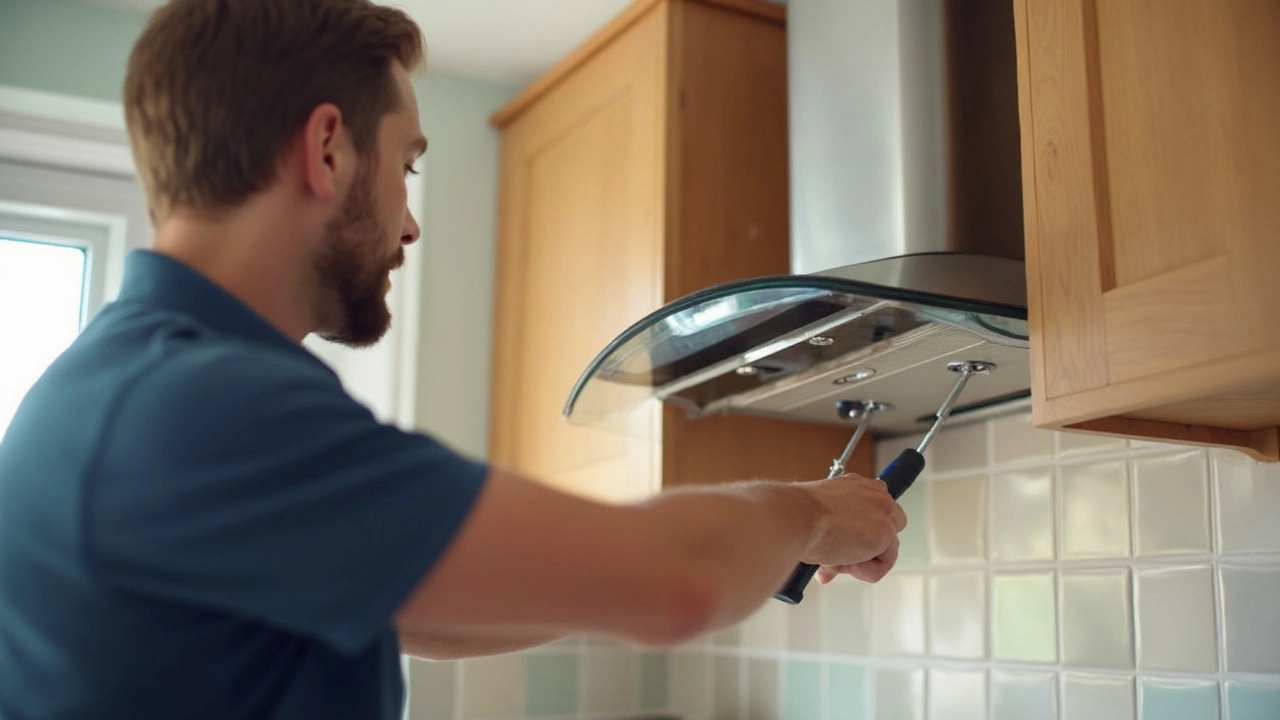Ever wonder who you should call when your extractor fan starts making those odd clanking noises? Or maybe you're in the process of renovating your kitchen or bathroom and need to figure out who's supposed to install that fan. Well, you're not alone! Extractor fans are the unsung heroes of our homes, keeping the air fresh and preventing moisture buildup. Knowing who to rope in for a proper installation or repair can save you a lot of headaches—and perhaps a good chunk of change.
Generally, installing extractor fans isn’t a solo gig. It typically requires someone with electrical know-how, like a qualified electrician, to ensure it's safely wired and functional. In some places, it's even a legal requirement to have a certified professional do the job. Why? Because you're dealing with electricity and ensuring correct venting to the outside, which isn’t something to wing.
If your fan's on the fritz, it’s a bit of a judgment call whether you repair or replace it. Many issues, like strange noises or weak suction, might just need a quick fix, maybe a loose connection or cleaning a clogged filter. But if your fan is older than your middle school diploma—speaking in plain terms, over ten years old—it might be time to swap it out for a new, energy-efficient model.
- The Role of Extractor Fans
- Who Handles Installation?
- Repair or Replace?
- Choosing the Right Professional
- Practical Maintenance Tips
The Role of Extractor Fans
So, what exactly do extractor fans do? At their core, extractor fans are designed to clear out unwanted air, odors, smoke, and humidity from our homes. They play a crucial role in ensuring good indoor air quality, keeping mold and condensation at bay—especially important in wet rooms like kitchens and bathrooms.
Key Functions of Extractor Fans
- Removing Moisture: Excess moisture can cause mold, which nobody wants. Extractor fans help whisk away that damp air, protecting paint and tiles from damage.
- Eliminating Odors: Whether it's the lingering scent of last night's fish fry or the musty smell from a hot shower, these fans do an excellent job in keeping the air smelling fresh.
- Reducing Contaminants: Fans help in expelling pollutants and allergens, making them a blessing for folks with allergies.
An extract from a study by the Home Ventilation Institute suggests that in areas like the kitchen, fans can remove up to 80% of smoke and airborne particles. That's a significant chunk of what you'd want to keep out of your living space, right?
"Extractor fans are essential for maintaining a healthy indoor environment. They help reduce moisture and improve air quality by removing pollutants and odors." — Dr. Anne Ellison, Indoor Air Quality Expert
Furthermore, a good extractor fan can also cut down on energy bills. By reducing the need for air conditioning and dehumidifiers, they help conserve energy and lower those utility costs.
Choosing the Right Fan
When it comes to picking the right fan, consider the size and specifications of your room. A larger space may require a more powerful fan. You can usually find this information in the fan's CFM (cubic feet per minute) rating. For instance, bathrooms typically need a fan with a rating of at least 50 CFM.
Overall, these trusty units are more than just a household accessory—they're an investment in your home's health and comfort. And knowing their role helps you appreciate why having a reliable fan installed by a professional is key.
Who Handles Installation?
Setting up an extractor fan might seem like a straightforward task, however, it's definitely a job for the pros. You typically want someone who knows their way around electrical systems because doing it wrong could mean more than just a blown fuse. Besides, local regulations in many areas demand that the installation of these fans be carried out by certified professionals. That means you’re usually looking at hiring an electrician or an HVAC specialist.
The Role of Electricians
The first call for most people when dealing with installation is an electrician. Their expertise is crucial because they ensure the fan is wired correctly, making sure everything is safe and follows local building codes. They also know the ins and outs of how much power your fan will need and ensure it's compatible with your home's electrical capacity.
HVAC Specialists and When to Call Them
Now for those complex systems or large homes, you might lean on an HVAC specialist. These folks dive a bit deeper—pun intended—into the heating, ventilation, and air conditioning systems. They can assess how an extractor fan will integrate with your existing setup, especially when dealing with complex ductwork or if you might need additional ventilation to prevent moisture build-up.
- Electricians ensure proper wiring and safety.
- HVAC specialists handle intricate ventilation setups.
So how do you make the call on who to hire?
- Assess the complexity: If it’s a simple replacement, an electrician might be your best bet.
- Check local regulations: Some areas enforce strict rules about who can do the work.
- Consider your current system: If it's part of a larger HVAC setup, go with a specialist.
Ultimately, getting the right professional on the job ensures not only that your fan works efficiently but that it’s also doing its job of keeping your home’s air quality top-notch.

Repair or Replace?
So, your trusty extractor fan is misbehaving, and you're stuck wondering whether to repair it or just throw in the towel and get a new one. It's a common dilemma. Let's break it down with a few pointers to help you out.
When Repair Makes Sense
Not every issue calls for a replacement. Here are some red flags that typically suggest a repair:
- Weak air suction: Often, this just means your fan needs a good clean or the vents are blocked. Clearing out dust and debris might save you a heap of trouble.
- Odd noises: If your fan is making rattling or buzzing sounds, it might be a simple case of tightening loose screws or replacing a worn-out part.
- Fan not turning on: This could be a power supply issue or a faulty switch, both of which are fixable with a little DIY or professional help.
Time for a New Fan
On the flip side, there are problems you shouldn't ignore, especially if your fan's been hanging around for over a decade:
- Excessive age: If your fan is more than ten years old, it's probably lacking the efficiency of newer models. In the long run, a replacement could save on energy bills.
- Extensive damage: Damaged blades or housing? It's usually cheaper to buy a new fan than to replace major components.
- Constant repairs: If you're fixing more than using, it's time for a new one. Frequent repairs add up and might cost you more than a new, sturdier model.
Crunch the Numbers
Still unsure? Consider comparing costs. Here's a basic idea of what you might expect to pay:
| Action | Typical Cost |
|---|---|
| Basic repair | $50 - $150 |
| New fan plus installation | $180 - $500 |
Factor in long-term energy savings and efficiency when considering a new fan. A modern, energy-efficient extractor fan might lower your electric bill, making it a smarter financial choice over time.
So, if you're weighing up the repair or replace decision, take stock of these considerations. And remember, sometimes choosing a new fan not only refreshes the air but also upgrades your home with better technology.
Choosing the Right Professional
So, you've figured out that you need some help with your extractor fan, but who do you call? Please don't pick the phone at random! Choosing the right professional is crucial for a job well done. Let's make sure you get someone who knows their stuff.
Start with an Electrician
When electricity is involved, it’s usually best to call a licensed electrician. They’re your go-to for wiring and ensuring everything’s up to code. If you're installing a new extractor fan or upgrading an old one, an electrician will make sure it’s all safe and sound.
“Getting a licensed electrician ensures you aren't taking shortcuts when it comes to safety,” advises Jim Turner, a certified home inspector with over two decades of experience.
Consider an HVAC Specialist
If ventilation is a major concern, or if your fan is part of a larger heating, ventilation, and air conditioning system, an HVAC specialist might be the way to go. They're trained to make sure all aspects of air flow work seamlessly together.
Research and Reviews
Before handing over money or keys, do a bit of homework. Check online reviews, ask friends or neighbors for recommendations, and verify any professional's credentials. Don’t forget to see if they have prior experience with your type of extractor fan.
Get Quotes and Compare
Don't hesitate to get a few quotes. Comparing prices and understanding what each professional offers can guide you to an informed decision. Some may throw in extras like a maintenance check-up or warranty.
- Check licensing and insurance.
- Get a detailed estimate.
- Inquire about follow-up support.
Taking these steps ensures you’re not just throwing darts at a board blindfolded. You’ll have peace of mind knowing your extractor fan is in capable hands.

Practical Maintenance Tips
Keeping your extractor fan in tip-top shape doesn't have to be a chore. A few simple maintenance tips can help ensure it runs efficiently for years.
Regular Cleaning
Hands down, the best thing you can do for your fan is to clean it regularly. Dust and grease buildup is a big issue, especially in kitchen fans. Every couple of months, unplug the fan and remove the cover to give it a thorough wipe down. If it's your bathroom fan, be careful to remove any stuck lint or dust. This simple step can prevent a lot of common repair issues.
Check the Filters
Some extractor fans come with filters that need cleaning or replacing. Make sure to check the manufacturer's guidelines on how often they should be swapped out. Generally, filters need a look every 6 to 12 months.
Test Efficiency
From time to time, place a piece of paper over the fan when it's on. If it sticks, your fan's likely in good working order. If not, there could be an issue needing attention. This simple trick checks if your fan's still pulling its weight.
Screw Check
Have a quick scan every now and then to make sure all screws and mounts are still tight. Loose fittings can cause rattling sounds and inefficiency.
| Maintenance Frequency | Action |
|---|---|
| Monthly | Basic cleaning and inspecting vent for blockages |
| Every 6 Months | Check and clean filters, and lubricate moving parts if needed |
| Annually | Professional check-up or deep clean |
Keeping up with these tasks ensures your extractor fan not only functions well but also extends its lifespan, saving you money and hassle in the long run.

I am an expert in the services industry with a focus on appliance repair. My passion lies in understanding how things work and educating others in simple, engaging ways. This enthusiasm fuels my writing, where I delve into topics around appliance maintenance and troubleshooting. I aim to make these subjects clear and accessible to all readers.